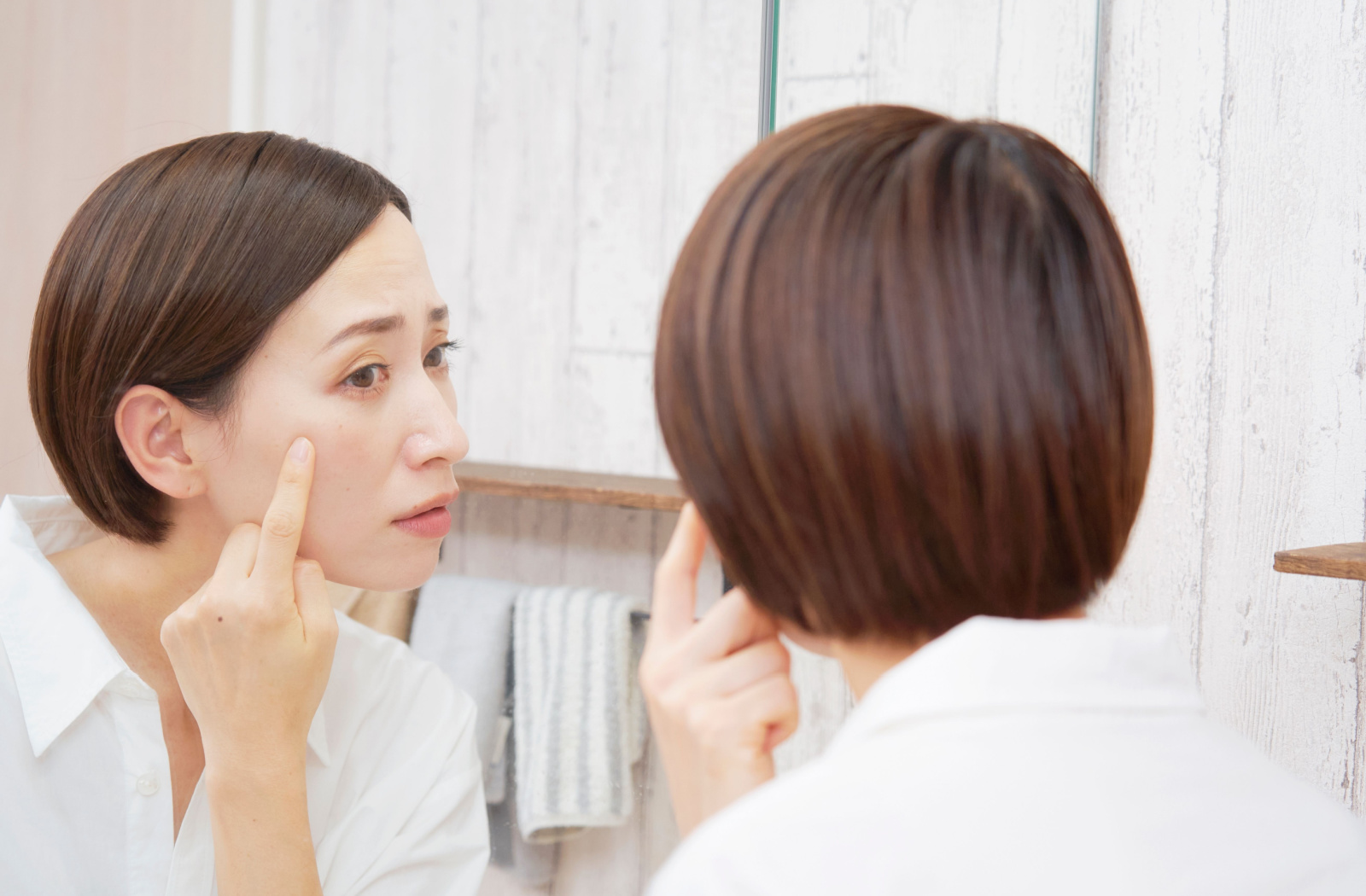If you feel like the skin under your eyes or around your eyes is drier than usual, you aren’t alone—this is much more common than many think. The skin in these areas is extremely delicate, making it more susceptible to drying out. Common causes of dry skin under the eyes or around the eyes include:
- Allergies
- Reactions to food
- Problems with oil production
- Environmental factors
- Skin conditions or other medical problems
- Lifestyle habits
- Poor skincare
Fortunately, dryness around the eyes can be treated by your optometrist. They can perform a comprehensive eye exam, determine what is causing your skin problems, and recommend a personalized treatment plan.
Allergies
Allergies are a common cause of dry skin around the eyes. They occur in response to various triggers, such as pollen, dust, or pet dander. Allergies are your immune system’s response to foreign materials it perceives as threats, releasing antibodies that can cause inflammation and irritation.
This inflammation can affect delicate skin, like the skin under the eyes, causing it to lose its ability to retain moisture. Over time, this can result in dry, itchy, and flaky skin.
Reactions to Food
Food allergies or sensitivities can also contribute to dry skin under the eyes. Common culprits include dairy, sugar, and gluten. If you’re allergic to certain foods, your body releases histamines when you consume them, leading to inflammation that can compromise skin health—especially in sensitive areas.
Even food intolerances, like sensitivity to sugar or gluten, can cause inflammation that manifests as redness, dryness, and irritation in the skin around the eyes. Since this skin is thinner and more delicate, it’s often the first to show signs of a reaction.
Reduced Oil Production
Aging naturally reduces the amount of oil your skin produces, and this can lead to dry skin around the eyes. The skin in this area is already thin and vulnerable, making it more prone to dryness as oil production decreases over time.
Skin & Medical Conditions
Skin or medical conditions can also play a part in developing dry skin around the eyes. These often include:
- Eczema: An inflammatory skin condition causing itchiness, dry skin, rashes, scaly patches, and blisters.
- Blepharitis: Inflammation of the eyelids causing flakes on the eyelashes, loss of eyelashes, eye redness, dry eyes, light sensitivity, and eye irritation.
- Psoriasis: A chronic autoimmune condition characterized by red elevated patches and flaking silvery scales.
- Hyperthyroidism: A condition that prevents the thyroid from releasing enough hormone. It can lead to various issues, including dry skin.
- Rosacea: A chronic skin condition primarily affecting the face, causing redness, zits, and patches of dry skin, especially around the eyes.
Poor Skincare
Improper skincare habits can worsen dryness under the eyes. Using harsh cleansers, exfoliating excessively, or failing to use sunscreen can damage delicate skin.
A dermatologist can help you develop a skincare routine tailored to your skin type, ensuring you avoid further irritation.
Lifestyle Habits
Your lifestyle choices play a major role in maintaining the health of your skin, including the skin around your eyes. Factors that can contribute to dryness include:
- Excessive alcohol use: Alcohol dehydrates the body, leading to dry skin. Stay hydrated, especially if you’re drinking alcohol.
- Smoking: Smoking restricts oxygen flow, contributing to premature aging and dry skin under the eyes.
- Poor diet: A diet rich in fruits, vegetables, whole grains, and healthy fats promotes skin health.
- Lack of sleep: Insufficient sleep can lead to under-eye dryness and dull skin. Aim for 7–9 hours of sleep nightly.
- Chronic stress: Stress can disrupt your body’s natural hormone balance, potentially leading to dry skin around the eyes.
Environmental Factors
Dry skin around the eyes can also be caused by external environmental factors like:
- Cold weather
- Low humidity
- Prolonged sun exposure
- Exposure to moving air, like wind, fans, or air conditioning units
- Hot showers or baths
To keep the skin under your eyes hydrated and healthy, consider using a humidifier indoors and applying sunscreen when outdoors.
Treating Dry Skin Around the Eyes
When dealing with any condition in or around the eyes, your first step should be to visit your optometrist. As an eye care professional, they can examine and diagnose the cause of the dryness and recommend a personalized treatment to address your specific concerns.
At See and Be Seen Eyecare, we know how irritating dry skin around the eyes can be. Book an appointment with us today, and let’s work together to find out what’s causing your dry skin.













